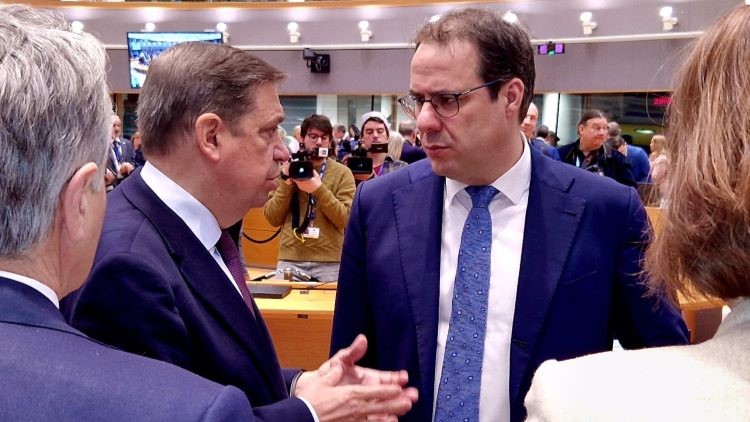Ane Barcos/Aquí Europa / Eduardo González/The Diplomat
The Minister of Agriculture, Fisheries and Food, Luis Planas, yesterday positively assessed the progress of the Council of Ministers of Agriculture and Fisheries of the European Union (EU) to respond to the simplification and flexibility of the Common Agricultural Policy (CAP).
In Brussels, ministers analyzed and debated the short and medium-term measures proposed by the European Commission to identify and reduce the obstacles and administrative burdens faced by European farmers and thus provide some relief to both farmers and companies. national administrations. In the opinion of the 27, these proposals are “on the right path”, but they are not enough, which is why they urged the Commission to “quickly complete all these measures with new, more ambitious ones.”
The text, prepared by the Community Executive and subsequently sent to the Belgian Presidency, advocates simplifying some of the conditionality requirements that EU farmers must meet and also simplifying the methodology for certain controls, with the aim of reducing up to 50 % the number of visits to farms by national administrations.
In the press conference after the Council, the Belgian Minister of Agriculture, David Clarinval, warned that, although reducing administrative overload is one of the concerns expressed by the agricultural community, it is not the only one, and, Therefore, although the Commission’s proposal could be applied in the short term, “it is necessary to approve measures that have a concrete impact in the medium and long term.”
For his part, Luis Planas thanked the European Commission’s proposals for considering that they include “a large part of the Spanish measures.” In his opinion, the Commission’s simplification measures “are in good line to resolve issues of concern, such as the excessive demands of reinforced conditionality, the complexity of aspects such as georeferenced photos or the need for the proper functioning of the food chain.”
Thus, among the measures that have to do with the simplification of the presentation of CAP applications, Planas highlighted the elimination of conditionality controls due to the high bureaucratic burden it implies for farms of less than ten hectares in area. This measure has a great impact in the case of Spain, since it benefits 345,000 farmers, 55% of the total recipients of CAP aid, according to the Ministry of Agriculture.
In any case, the minister warned that greater speed is necessary in the application of the measures, especially those that require a modification of the base regulations, since the European legislature is about to conclude – the Parliamentary elections are being held between June 6 and 9 – and farmers and ranchers await urgent solutions.
The minister also stated that the reopening of the base regulation must also imply a reflection on the changes that are going to be introduced in a CAP that was designed in a very different context from the current moment in which it has to be applied, in which farmers and Livestock farmers are greatly affected by the increase in costs and other difficulties derived from the war in Ukraine and the effects of climate change, especially sensitive in Spain.
The last reform of the CAP, carried out in 2021, introduced a series of changes that have generated discomfort among farmers’ associations, such as the establishment of “eco-schemes”, a system of incentives for agricultural holdings to carry out aligned environmental practices. with the EU objectives. According to agricultural organizations, these requirements hinder both agricultural activity and its profitability because they condition the granting of CAP aid, lead to an increase in bureaucratic burdens and entail guidelines that reduce the productivity of farms.
Mirror clauses
Luis Planas brought to the Council two other fundamental issues to respond to the concerns of the sector: the proper functioning of the food chain, so that all links obtain adequate remuneration, and, as he had announced last week before the Congress, the authorization of formulas so that food imports are subject to the same requirements that European producers are obliged to meet.
In this sense, he assured that Spain will defend the mirror clauses so that products that are not authorized in the EU cannot be used by products that reach the community market. Spain, he assured, was one of the pioneers in requesting its implementation a few years ago and, when “the demand is fair and we have arguments, as is the case, we must be constant before the community institutions.”






